Ebooks
A number of NewEpicurean.com materials are available as Audio MP3 downloads.
See below in RED for download links for full
books or important portions.
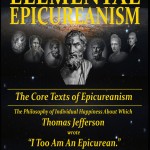 |
ELEMENTAL EPICUREANISM – This is ebook is a compilation of the core ancient texts in various versions. It contains several English translations of the Diogenes Laertius “Life of Epicurus”, Lucretius’ “On The Nature of Things,” lengthy selections from Seneca, as well as other material of particular interest. Later writings include Frances Wright’s “A Few Days In Athens,” Gassendi’s “Life and Morals of Epicurus,” and shorter Epicurean selections from other writers. Links: Epub Version. Mobi Version. Facebook page for announcements of new editions. |
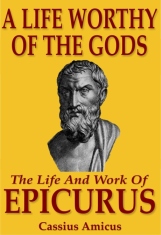 |
A Life Worthy of the Gods – The Life and Work of Epicurus – This is a reference book which contains Diogenes Laertius’ biography, Norman DeWitt’s introductory article “Philosophy for the Millions,” Cicero’s “Defense of Epicurus” from “On Ends,” excerpts from Lucretius, The Vatican List, and excerpts from the letters of Seneca. |
| An Introduction to the Nature of Things – This book contains the full text of H.A.J. Munro’s classic translation of “On The Nature of Things.” There are many more modern translations available, but Munro remains a widely respected authority, and his translation favors accuracy of presentation over any effort to retain a poetic form. Translators of the poem have a strong tendency to edit the material to fit their own ideas and retain the poetic form, but Munro is more trustworthy because he attempts to avoid both those pitfalls. The opening of this ebook contains my paraphrase of the important passages from Lucretius. In my view Lucretius remains a largely unappreciated treasure, largely because anyone not trained as a historian finds it difficult to wade through the ancient mythology and appreciate the illustrations. My paraphrase is of course no substitute for the original, but it is intended to help the reader grasp the subject on a general level to assist digging deeper later. | |
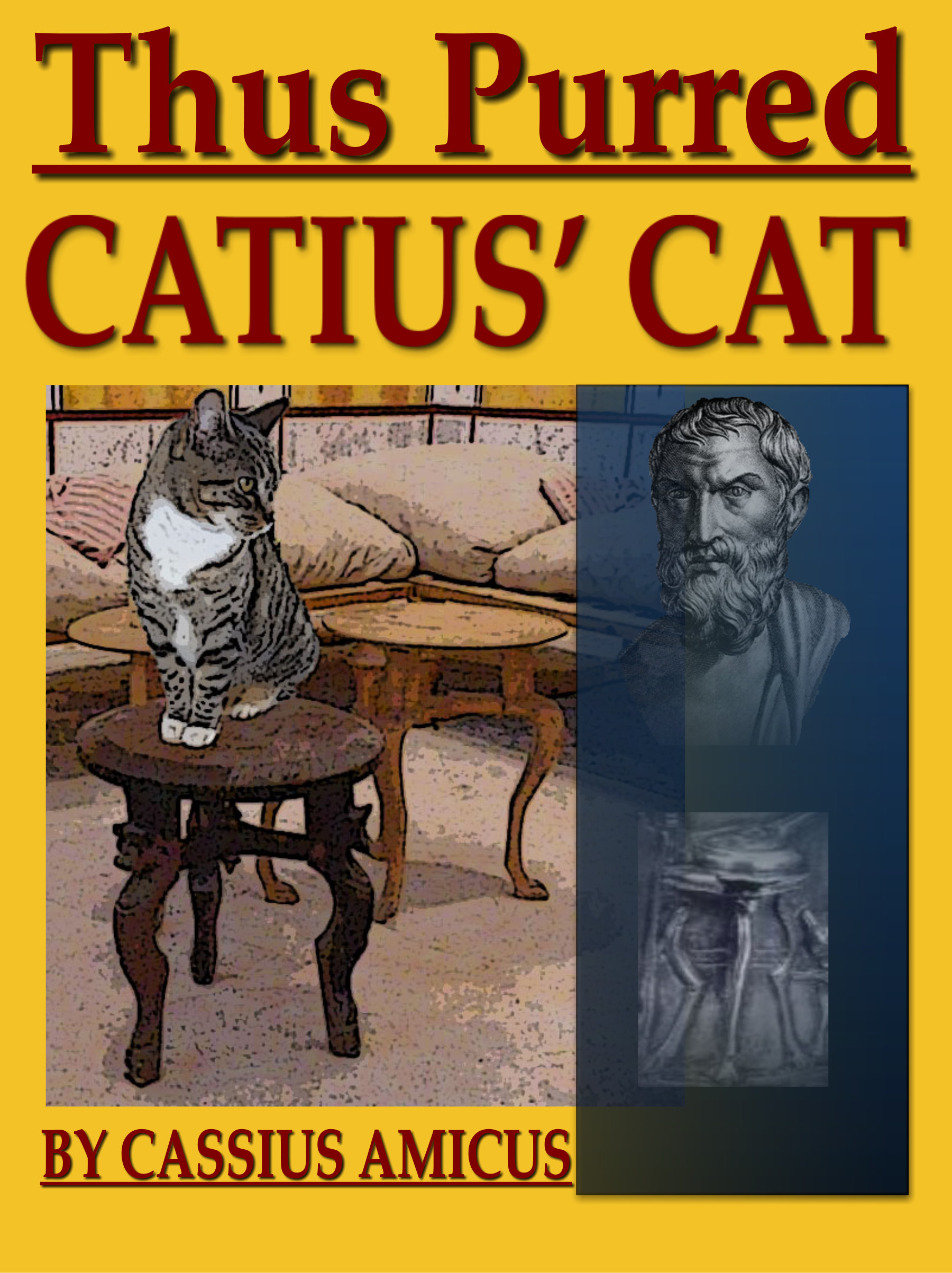 |
Thus Purred Catius Cat – My basic fundamental introduction to the ideas of Epicurus, suitable for someone who has never heard of Epicurus. This provides an initial elementary framework for the overall ideas of Epicureanism. Click here to download the full Audiobook |
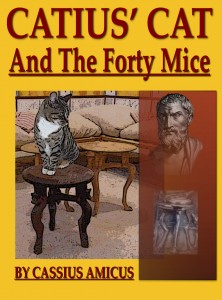 |
Catius Cat and the Forty Mice – A development of the first poem, this expands the first poem toward the direction of a simplified statement of the Forty Authorized Doctrines. |
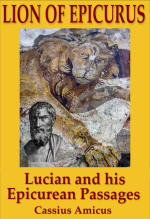 |
Lion of Epicurus – Lucian And His Epicurean Passages – This ebook contains a selection of the dialogues of Lucian of Samosata. Lucian was very much a fan of Epicurus, and several of his dialogues are very helpful for understanding Epicurean doctrine. My favorite in particular is HERMOTIMUS, which gives an excellent presentation of the Epicurean criticism of Stoic doctrine. |
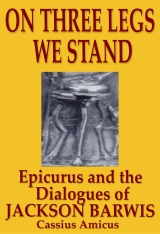 |
On Three Legs We Stand – Epicurus and The Dialogues of Jackson Barwis – Jackson Barwis is largely unknown today, but I came across his two major works (“Three Dialogues on Liberty” and “Dialogues on Innate Principles”). The main one of interest to Epicureanism is “Dialogue on Innate Principles” which is an extended argument against the “blank slate” theory of John Locke (which derives from Aristotle and others). It is my opinion that one of the most interesting issues in Epicureanism is the nature of “Anticipations.” I follow the Dewitt interpretion that Epicurus held them to relate to a form of “intutition,” and Barwis’ Dialogue on Innate Principles – without ever mentioning Epicurus – provides a persuasive argument for how such a faculty of innate principles might work, and why such a faculty must exist. |
| Norman DeWitt – Epicurus and His Philosophy – This is the most important work on Epicurus in the last two hundred years, in my humble opinion. Other books provide deeper scholarly resources, but this combines a thorough scholarly history of the man Epicurus with a sweeping and sympathetic presentation of his overall doctrine. | |
| A Few Days In Athens – This is the outstanding work by Frances Wright that Thomas Jefferson called “a treat of the highest order.” It is a fictional story written in the style of a Platonic dialogue, and it sets out in an interesting story the major differences between Epicurus’ views and those of the Stoics, Cynics, Pythagoreans, and Aristotelians. In Jefferson’s time there was doubt as to whether this was actually authored by Frances Wright, who was a young lady of only twenty-six at the time, or by someone else. In my view the amazing maturity of the insights and the presentation do bring her authorship into doubt, especially since she appears to have written little else about Epicurus in her life. But regardless of who wrote it, the book stands on its own. It is important to note that the author deviates in several significant respects from what I consider to be “authentic” Epicurean doctrine, as I have set forth in the introduction. Wright’s explanation of Epicurus’ views on the nature of the gods, and of his views on Fate, appear to me to be more nineteenth century materialism than original Epicureanism. However with the caveats mentioned as a caution, this is an outstanding book. | |
| The Same Span of Time – The Major Works of Thomas Cooper MD – Thomas Cooper MD was a friend of Thomas Jefferson, and apparently a student of Jackson Barwis. Cooper makes few direct references to Epicurus, but several of his essays on Materialism are of direct relevance to major issues in Epicureanism. Cooper lived a number of years before Frances Wright, and in both A Few Days in Athens and Cooper’s work, the theories of Joseph Preistley play major roles. Both writers appear to follow Preistleyite views on determinism that are largely incompatible with Epicurean ideas, but with that caveat Cooper’s works provide excellent arguments in support of the “materialistic” viewpoint. | |
For new readers, here is my suggestion for an order in which you might want to approach reading this material:
- The Doctrines of Epicurus – Annotated – This is a reference that provides simply the Forty Authorized doctrines, followed in each case with excerpts from main ancient texts that support each one.
- The Tripod of Truth – This short book is devoted to setting forth the ancient texts that relate to Epicurus’ lost “Canon of Truth.” In this material I follow the interpretation of Norman DeWitt as to the nature and role of Anticipations, which remains a controversial subject among Epicurean scholars.
- Ante Oculos – This was my first ebook, and in it I attempted a to synthesize the major points of the philosophy with footnotes to the important texts that support them. The appendix to this book contains full copies of most of the important texts. This continues to be useful as reference and perhaps for finding the supporting data for important doctrines, but this as this is my oldest ebook it is most in need of a rewrite.
